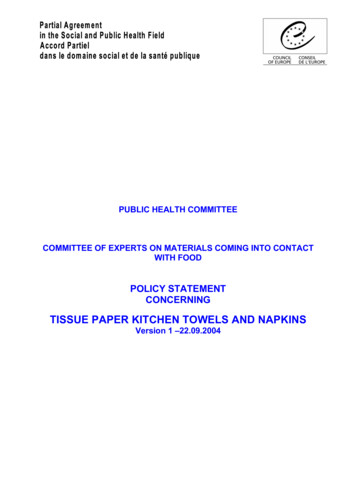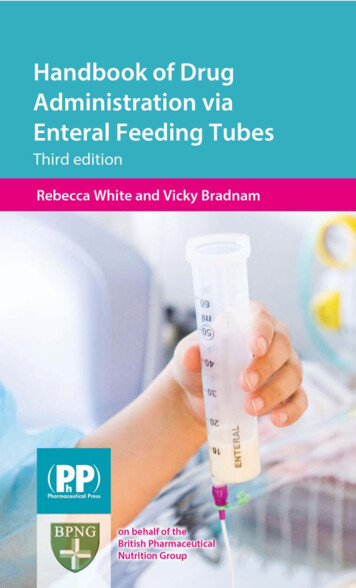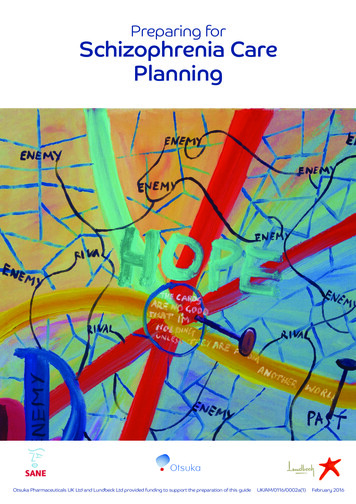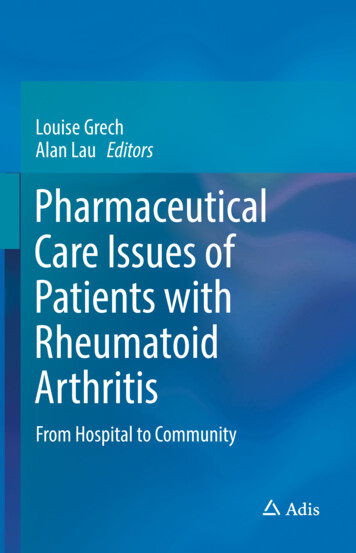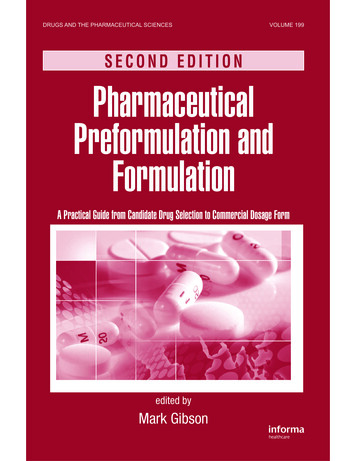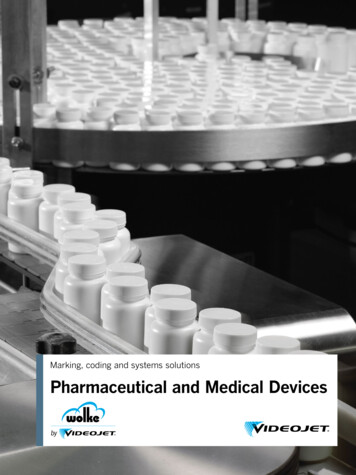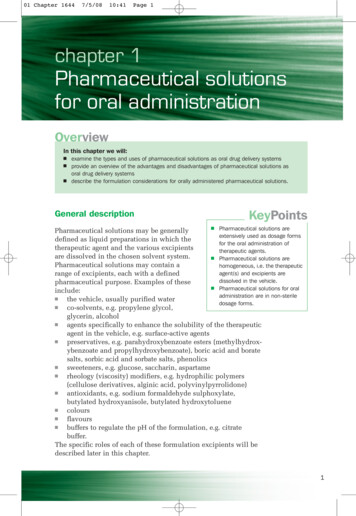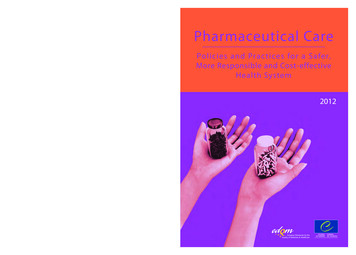
Transcription
PHARMACEUTICAL CAREPolicies and Practices for a Safer, More Responsible and Cost-effective Health SystemMedication is the most frequent intervention within healthcare systems. Often,the benefits of medication cannot be realised in patients, and even worse,considerable mortality and morbidity are caused by the inappropriate use ofmedicines. Pharmaceutical care is a quality philosophy and working methodfor professionals within the medication process, indispensable for the goodand safe use of medicines. The Committee of Experts on Quality and SafetyStandards for Pharmaceutical Practices and Pharmaceutical Care, coordinatedby the EDQM, carries out activities comprising the development of generallyapplicable and specific indicators of the implementation of pharmaceuticalcare in Europe and beyond. Governments and policy-makers are invited to actagainst harm, reduced life quality, workforce reductions, and wasted resourcesthat arise from the inappropriate use of medicines and drug-related problems.The EDQM is a Directorate of the Council of Europe – an internationalorganisation founded in 1949, now with 47 member states covering virtuallythe entire continent of Europe. The Council of Europe seeks to developcommon democratic and legal principles based on the European Conventionon Human Rights and other reference texts on the protection of individuals.www.edqm.euPharmaceutical CarePolicies and Prac tices for a S afer,More Responsible and Cost-effectiveHealth System2012
Pharmaceutical CarePolicies and Practices for a Safer,More Responsible and Cost-effectiveHealth SystemEuropean Directorate for the Quality of Medicines & HealthCare, EDQM
Pharmaceutical Care – Policies and Practices for a Safer,More Responsible and Cost-effective Health System is publishedby the Directorate for the Quality of Medicines & HealthCare ofthe Council of Europe (EDQM).All rights conferred by virtue of the International Copyright Conventionare specifically reserved to the Council of Europe and any reproductionor translation requires the written consent of the Publisher.Director of the Publication: Dr S. KeitelPage layout and cover: EDQMEuropean Directorate for the Qualityof Medicines & HealthCare (EDQM)Council of Europe7, allée KastnerCS 30026F-67081 STRASBOURGFRANCEWebsite: www.edqm.euFor ordering: www.edqm.eu/storeFAQs & EDQM HelpDesk: www.edqm.eu/hd Council of Europe, 2012Printed on acid-free paper at the Council of Europe
AcknowledgementsThis paper was jointly prepared by Dr David Cousins, Consultant,Head of Safe Medication Practice, National Patient Safety Agency,National Health Service, United Kingdom; Mr Nico Kijlstra, ScientificLeader of the Pharmaceutical Care Project, Vice-Chairman of theEuropean Committee on Pharmaceuticals and Pharmaceutical Care(CD-P-PH), Council of Europe; and Dr Sabine Walser, responsibleAdministrator, EDQM, Council of Europe.Sincere thanks are owed to Dr Cousins for contributing his vastknowledge and practical experience with the pharmaceutical carephilosophy and its working methods to this paper. The Secretariatwishes to express its gratitude to Mr Kijlstra for providingconstant guidance on the policy and practice-related aspects of thepharmaceutical care activities co-ordinated by the EDQM and forliaising between and encouraging the delegations of the member statesof the Partial Agreement of the European Pharmacopoeia and thenetwork of scientists involved in the development and implementationof the pharmaceutical care activities at the EDQM. The Secretariathighly appreciates the enriching and fruitful discussions with bothDr Cousins and Mr Kijlstra on the topic, which were instrumental tothe preparation of this paper.3
Pharmaceutical CareThe authors of the paper wish to commend all the scientists whoare collaborating with the project “Assessment of the quality ofpharmaceutical care in Europe through indicators” and who areproviding their high level of expertise and constant motivation,namely:Dr Zinaida BEZVERHNI, State University of Medicine and Pharmacy,Chisinau, MoldovaDr Zaza CHAPICHADZE, MD, Drug Regulatory Authority forMedical Activities, GeorgiaDr Afonso CAVACO, then: University Lisbon, PortugalProfessor Han DE GIER, University of Groningen, the NetherlandsMs Marlies GEURTS, University of Groningen, the NetherlandsDr pharm. Olga GRINTSOVA, National University of Pharmacy,Kharkov, UkraineDoz. Dr. habil. Dr Michael HARTMANN, University Hospital Jena,GermanyDr Martin HENMAN, University Dublin, IrelandProfessor Christian LOVIS, MD, University Hospitals of Geneva,SwitzerlandDr Carla MEYER-MASSETTI, Swiss Patient FoundationProfessor Agnieszka SKOWRON, Jagiellonian University, Krakow,PolandProfessor Afrim TABAKU, Albanian University, Tirana, AlbaniaDr pharm. Kristine VRUBLEVSKA, Pharmacists’ Society of Latvia***The views expressed in this paper do not necessarily reflect the officialopinions of the parent organisations of Dr Cousins, Consultant,Mr Kijlstra, Scientific Project Leader and Vice-Chairman of theCommittee CD-P-PH, and of the collaborating scientists.4
ContentsPreface.7Executive Summary.9Pharmaceutical care – policies and practices for a safer,more responsible and cost-effective health system1. Defining pharmaceutical care. 172. Council of Europe activities in pharmaceutical care. 183. The case for pharmaceutical care.203.1. Inappropriate and unsafe use of medicines.203.1.1. Medication error reports. 203.1.2. Prescribing errors.213.1.3. Dispensing errors.233.1.4. Medicine administration errors (MAE). 243.1.5. Preventable adverse drug events (pADEs) in ambulatory care.253.1.6. Under-reporting of adverse drug reactions (ADRs). 263.2. Poor adherence to prescribed medicines and lack ofeffectiveness. 274. Evidence of the benefits of pharmaceutical care.294.1. Australian research on community pharmaceutical careinterventions.294.2. Preventing adverse drug events/medication errors in generalpractice in the United Kingdom.314.3. Pharmaceutical care for hospital in-patients. 325
Pharmaceutical Care4.4. Pharmaceutical care in community or ambulatorycare settings. 334.5. Pharmaceutical care and antibiotic stewardship.344.6. Pharmaceutical care and adverse drug reaction (ADR)reporting.365. Indicators for pharmaceutical care as a tool to achieve thebenefits of responsible medication use. 385.1. Background to the EDQM indicator developmentprogramme. 385.2. On-going research to develop indicators for the quality ofpharmaceutical care.395.2.1. Pharmaceutical care interventions: monitoring and improvingpharmacists’ knowledge and implementation of the pharmaceuticalcare philosophy and working methods. 395.2.2. Pharmaceutical care interventions: develop, agree, implementand monitor the therapeutic plan in co-operation with the patient,taking account of patient needs and expectations through patientinvolvement and promoting patient medication-relatedhealth literacy. 425.2.3. Pharmaceutical care interventions: monitoring of therapeuticplans and medicine safety by linking information about patients’medications and medical conditions from different entry points withinthe healthcare system. 445.2.4. Pharmaceutical care communication interventions: indicatorsfor the availability of individualised information for patients aboutself-medication, and availability of pharmacist-prescriberco-operation on a possible/actual drug-related problem. 485.2.5. Pharmaceutical care – a benefit for healthcare systems: indicatorsfor the safe and effective use of medicines. 506. Conclusions and proposals for Health Ministers. 53References.566
PrefaceThe acceptation of the philosophy of pharmaceutical care throughoutthis publication and working programme is based on the definitionestablished by Charles D. Hepler and Linda M. Strand.1Definition of pharmaceutical carePharmaceutical care is the responsible provision of drug therapy forthe purpose of achieving definite outcomes that improve a patient’squality of life.These outcomes are (1) curing a disease, (2) elimination or reductionof a patients’ symptomatology, (3) arresting or slowing down a diseaseprocess, or (4) preventing a disease or symptomatology.Pharmaceutical care involves the process through which a pharmacistco-operates with a patient and other professionals in designing,implementing, and monitoring a therapeutic plan that will producespecific therapeutic outcomes for the patient. This, in turn, involvesthree major functions:1. identifying potential and actual drug-related problems,21 Hepler C.D. & Strand L.M. Opportunities and Responsibilities in Pharmaceutical Care. Am. J. Pharm. Educ., 53, 7S-15S (1989) and Hepler C.D. & Strand L.M.Opportunities and Responsibilities in Pharmaceutical Care. Am. J. Hosp. Pharm., 47,533-543 (1990).2 C.D. Hepler and L.M. Strand, 1989 and 1990: “. A drug-related problem is an eventor circumstance actually interfering with the patient experiencing the optimumoutcome of medical care (preventing best possible medication outcomes). Theconcept of drug-related morbidity includes both treatment failure and a newmedical problem.” Hepler and Strand defined categories of drug-related problems7
Pharmaceutical Care2. resolving actual drug-related problems, and3. preventing drug-related problems.Pharmaceutical care is a necessary element of healthcare, and shouldbe integrated with other elements. Pharmaceutical care is, however,provided for the direct benefit of the patient. The pharmacist is directlyresponsible to the patient for the quality of that care.The fundamental relationship in pharmaceutical care is mutuallybeneficial exchange, in which the patient grants authority to theprovider and the provider gives competences and commitment(accepts responsibility).The fundamental goals, processes and relationships of pharmaceuticalcare exist, regardless of practice-setting.which go beyond safety-related aspects: untreated indications, improper drugselection, sub-therapeutic dosage, failure to receive drugs, over-dosage, adverse drugreaction, drug interactions and drug use without indication.8
Executive summaryMedication is the most frequent intervention within healthcaresystems worldwide. Achieving the best possible outcome of medicationfor the quality of life of patients should be the primary aim of all healthprofessionals involved in the medication process, as well as carers andpatients, depending on their abilities and capacities.Often, the benefits of medication cannot be realised in patients (e.g.due to treatment failures), and even worse, considerable mortality andmorbidity are related to the inappropriate use of medicine use, forexample: inappropriate prescription (“prescribing errors”), inappropriate delivery (“dispensing errors”/“administration errors”), inappropriate patient behaviour (“non-adherence with treatmentregimen”), inappropriate monitoring and reporting, patient idiosyncrasy, lack of (medication-related) health literacy in the public.Pharmaceutical care is a quality philosophy and working methodfor professionals within the medication process. It is indispensablefor helping to improve the good and safe use of medicines, thusrealising the best possible outcome of medicines for the patient. Itcontributes to the optimisation of outcomes from medicines and theprevention of harm and inappropriate use. This is achieved throughthe promotion of medication-related health literacy, the involvementand participation of patients in their medication, and the assignmentand acceptance of responsibilities in an appropriate manner withinthe medication process. Together, these factors improve the quality oflife of patients and their families, the utilisation of resources and helpreduce inequalities in healthcare. By increasing the cost-efficiencyof medicine use, pharmaceutical care will contribute to efficient andeffective consumption of existing resources.9
Pharmaceutical CareIn line with the definitions established by C.D. Hepler and L.M. Strand,1989 and 1990, pharmaceutical care is the provision of drug therapyfor the purpose of achieving definite outcomes that improve a patient’squality of life, in a relationship where the patient grants authorityand the provider gives competence and commitment. It involves theprocess through which a pharmacist co-operates with a patient andother professionals in designing, implementing, and monitoring atherapeutic plan and influencing patient behaviour. This involvesengaging the patient in the treatment of his/her condition, and theidentification, handling and prevention of drug-related problems intheir broadest sense (e.g. treatment failure through inappropriate ormissing medication, adverse drug reactions).In 2008, the European Committee on Pharmaceuticals andPharmaceutical Care (CD-P-PH) (steering body) co-ordinated bythe European Directorate for the Quality of Medicines & HealthCare(EDQM), Council of Europe, commissioned a survey on key conceptsin pharmaceutical care and the performance indicators used toevaluate the quality of pharmaceutical care and pharmaceuticalservices in Europe (N. Kijlstra, K. Ridge and S. Walser, 2009). Thesurvey used the pharmaceutical care philosophy as defined byC.D. Hepler and L.M. Strand (1989 and 1990), with a particular focuson patient concordance/involvement, monitoring (documentation)and multi-disciplinary co-operation between healthcare professionalswithin the medication process and was, inter alia, inspired by Councilof Europe Committee of Ministers Resolution ResAP(93)1 on the roleand training of community pharmacists.The survey concluded, inter alia, that: pharmaceutical care is a quality philosophy and workingmethod indispensable for realising the benefits of medicine usefor the individual patient and at national levels. It emphasises theimportance of the provision of care in a responsible manner, inaddition to functions related to medicine quality and logistics ofsupply;10
Executive summary patient participation and concordance should be enhanced toensure best possible medication outcomes through, for example,increasing (medication-related) health literacy; policy-makers should include the implementation ofpharmaceutical care into healthcare systems on the political agenda; internationally-applicable practical guidance on the quality ofpharmaceutical care for healthcare professionals within the entiremedicine process should be developed; added-value of activities inspired by the pharmaceutical carephilosophy and working methods should be demonstrated; forexample, through outcome-related measures that assess safety,efficacy and cost-effectiveness; a set of basic indicators (see Table 1, page 13) should be developedand tested that are equally applicable to low-, middle-income andindustrialised countries. Co-operation between countries withdifferent situation as regards the implementation of pharmaceuticalcare should be strongly encouraged. When developing indicators forpharmaceutical care, clearly defined activities relating to healthcareoutcomes, acceptable to a wide range of countries, should be selected.Based on the conclusions of the above report, the Committee CD-P-PHoversees a programme of activities comprising the development andimplementation of a set of indicators, generally applicable and morespecific, of the implementation of pharmaceutical care in Europe. Theseactivities are carried out by a Committee of Experts, member statedelegates, with the help of a network of academic institutions acrossEurope, which are co-ordinated by the EDQM.In low-, middle-income and industrialised countries in Europe, theCommittee CD-P-PH activity aims to supporthealth authorities to: evaluate the outcomes of national policies in the field ofpharmaceutical care, assess the performance of the entire medication use process,11
Pharmaceutical Care identify needs for improvement, revise medicine-related healthcare priorities at the national levelthrough availing common standards, data and experience in othercountries in Europe, improve professional standards in collaboration with bodies/associations of healthcare professionals (e.g. pharmacists, doctors,nurses).healthcare professionals to: implement the pharmaceutical care concept in daily practice, provide standardised, reliable data on the outcomes of medication(pharmacotherapy), improve the evidence base and quality of their professional andpractice standards, in the framework of the support provided by therelevant professional bodies/associations.patients and patients’ organisations to benefit from: increasing availability and accessibility of reliable informationthroughout the whole medication process, significantly enhanced involvement in the decisions regardingmedication (pharmacotherapy) and commitment to therapeuticplans.This report summarises on one hand the evidence for inappropriateand unsafe use of medicines, non-adherence to good prescribingpractices, non-compliance with therapeutic plans, lack ofdocumentation and monitoring of therapeutic plans, preventableadverse drug reactions arising from this use, and on the other handthe benefits of wide-spread implementation of the pharmaceuticalcare philosophy and working methods for the individual patient andnational healthcare systems.33 C.D. Hepler and L.M. Strand 1989 and 1990: “ Pharmaceutical services likepharmacokinetic dosing, therapeutic monitoring, and drug information ”.12
Executive summaryIn line with the conclusions of the afore-mentioned EDQM (Council ofEurope) survey report on pharmaceutical care in Europe (N. Kijlstra,K. Ridge and S. Walser, 2009), this report recommends, inter alia, a basicset of pharmaceutical care indicators as outlined in Table 1 and proposestheir further development and implementation at international level.Table 1. Basic indicators for pharmaceutical careNo.IndicatorComment1Number of pharmaceuticalcare interventions delivered perstandardised denominator, suchas 1000 prescriptions dispensedor 1000 patients.These interventions need to be formallydocumented and audited and are intended toimprove the safe and effective use of medicines.Interventions can suggest a change in theway medicines are prescribed, dispensed,administered or monitored. They may alsoconfirm treatment decisions, foster patients’agreement and adherence to therapeutic plans,promote medication-related health literacy inpatients, and support the joint development,agreement and follow-up (monitoring)of treatment plans by patients and healthprofessionals.2Number of patients counselledabout their medicines perstandardised denominator, suchas 1000 prescriptions dispensedor 1000 patients.Formally documented and audited.3Number of formal writtenfeed-back responses frompatients during treatmentper 1000 prescriptions or1000 patients about patients'specific medication-relatedliteracy, concerns, life-qualityneeds/expectations, andsatisfaction.Formally documented and audited. This feedback should be preferably encouraged at anearly stage of the therapeutic plan in order tobetter implement and monitor the therapeuticplan. For examples of this indicator, seeItem 5.2.2.4Number of adverse drug eventreports (to include both adversedrug reactions and medicationerrors) per year.Formally documented and audited and reportedto recognised regional/national organisationsand there must be documented evidence oflocal learning and systems' improvement.Counselling comprises information given toan individual patient as part of the medicationprocess that is adequate to ensure his/herability to use the medication and to adapt his/her lifestyle in such a way as to have the bestpossible medication outcome.13
Pharmaceutical CareThese indicators are equally appropriate for in-patient and communitysettings, for hospital and community pharmacists, and otherhealthcare professionals, as applicable, in low-, middle-income andindustrialised countries in Europe and other regions of the world. Theindicators provide information about the range, quantity and quality ofpharmaceutical care interventions/services4 delivered. The indicatorsalso provide an opportunity to gather in-depth knowledge onpharmaceutical care practices regionally, nationally, and internationallythat will permit the sharing and follow-up of experiences over timeby professional disciplines and the health sector in general, regionally,nationally and internationally.These indicators are rather broad, and can be further developedand refined over time, but they are easily understood and will helppharmacists, other healthcare providers, and professional regulatorsto formalise and develop the pharmaceutical care philosophy and itsworking methods.In the conclusions, the report proposes elements of a specific healthpolicy agenda, which promotes approaches to realise the benefits ofresponsible medicine use in the best interests of patients’ quality of lifeand sustainable social cohesion, such as through the implementationof pharmaceutical care. Indicators provide information indispensablefor policy-makers and professional regulators to steer this process.Furthermore, the attention of policy-makers is drawn to theimportance of international co-operation as regards the establishmentof quality indicators for pharmaceutical care, evaluation and follow-upfor healthcare policies and best professional practices in this field.Implementing pharmaceutical care as a necessary quality-enhancingelement in healthcare requires innovative approaches to improvepatient participation, inter-professional collaboration in terms oftherapeutic planning and monitoring, and a better focus on improving4 See footnote 3 on page 12.14
Executive summarymedicine use through monitoring of outcome-related indicators ofpharmaceutical care.Governments and policy-makers are invited to: acknowledge that optimal health and development should bebuilt on the core pillars of participation, promotion, protection,prevention and provision and that an appropriate healthcareapproach must be patient-focussed and ensure patient participationin the healthcare decisions affecting them, fostering theirmedication-related health literacy; commit to take specific action against health damage, diminishedquality of life, work force reductions, and wasted healthcareresources that arise from the inappropriate use of medicines anddrug-related problems as understood in their broadest sense; acknowledge available evidence that the pharmaceutical carephilosophy and working methods can help achieve the benefits ofresponsible medicine use for individual patients and healthcaresystems at national and regional levels by addressing issues ofinappropriate medicine use in a comprehensive manner and,thereby, improving patient outcomes; promote and implement the pharmaceutical care philosophy andworking methods in their national healthcare systems; introduce in all countries of the world, generally applicable qualityindicators for pharmaceutical care to provide themselves with validinformation for policy-making and to set professional standardsand best practices in the field; in this context, support the wide application of generally applicablequality indicators for pharmaceutical care, as included in Table 1,page 13 of this report, and to provide for a mid-term strategy tofollow up on the results and measures taken in response to the datagenerated; support programmes and activities for international collaborationto further develop pharmaceutical care standards, guidelines andtraining for the implementation and monitoring of pharmaceutical15
Pharmaceutical Carecare using, inter alia, generally-applicable and specific qualityindicators. Examples of such programmes are those beingcarried out or supported by international organisations such asthe Council of Europe and its EDQM, the WHO and relevantprofessional associations of pharmacists (such as the InternationalPharmaceutical Federation, FIP), medical doctors, nurses and otherrelevant health professions; avail themselves of the professional expertise of public healthinstitutions, relevant professional associations (notably ofpharmacists, medical doctors, nurses and other relevantprofessions) and patient organisations.16
Defining pharmaceutical care1. Defining pharmaceutical careMedication is the most frequent intervention within healthcaresystems worldwide. Achieving the best possible outcome of medicationfor the quality of life of patients should be the primary aim of all healthprofessionals involved in the medication chain, as well as carers andpatients depending on their abilities and capacities.Pharmaceutical care is a quality philosophy and working methodfor professionals within the medication chain. It is indispensable forhelping to improve the good and safe use of medicines, thus realisingthe full potential of medicines available on the market to achieve thebest possible outcome in patients. It contributes to the prevention orreduction of inappropriate medicine use by promoting (medicationrelated) health literacy, the involvement and participation of patientsin their medication, greater equality in healthcare, and the balancedsharing of responsibilities. These factors serve to improve the qualityof life of patients and their families and the cost-effective utilisation ofresources and to reduce inequalities in healthcare.This report uses the definition of pharmaceutical care as established byC.D. Hepler and L.M. Strand (1989 and 1990) (see Preface, page 7).17
Pharmaceutical Care2. Council of Europe activities inpharmaceutical careCommitted to the promotion of human and social rights, notablythrough its European Convention on Human Rights and FundamentalFreedoms and the Social Charter, the Council of Europe adopted thefollowing relevant legal instrument addressing recommendations togovernments of member states in the context of a common policy withregard to pharmaceutical care:Council of Europe Committee of Ministers Resolution ResAP(93)1on the role and training of community pharmacists “ considers thatthe primary focus of pharmaceutical care shall at all times be targetedtowards patient advantage, either individually or collectively, whetherdirected at health promotion or maintenance, symptom relief, ormaximising benefits and minimising risks from medication ”.In accordance with the mission of the Council of Europe’s EuropeanDirectorate for the Quality of Medicines & HealthCare (EDQM),which includes “ the development of policies for the safe use ofmedicines in Europe, including through pharmaceutical care ”,the European Committee on Pharmaceuticals and PharmaceuticalCare (CD-P-PH), steering body, co-ordinated by the EDQM, wasmandated to “ contribute to improving public health and reducinghealth inequalities via developing harmonised provisions and practicesincluding the rational use of medicines, implementing and promotingpharmaceutical care in Europe (having regard to the internationallyrecognised definition of pharmaceutical care by C.D. Hepler andL.M. Strand (1990) adopted and amended by WHO/FIP ”.In 2008, the Committee CD-P-PH commissioned a survey on keyconcepts in pharmaceutical care and the performance indicators usedto evaluate the quality of pharmaceutical care and pharmaceuticalservices in Europe (N. Kijlstra, K. Ridge and S. Walser, 2009). Thesurvey used the pharmaceutical care philosophy and working methodsestablished by C.D. Hepler and L.M. Strand (1989 and 1990), with a18
Council of Europe activities in pharmaceutical careparticular focus on patient concordance/involvement, monitoring(documentation) and multi-disciplinary co-operation betweenhealthcare professionals within the medication process(see Diagram 1).Diagram 1Product-focussedpharmacist/pharmaceuticalservice Patient involvement:quality of life, needsand expectationsInter-professionalcollaborationPatient counselling andeducation: (medication-related)health literacyDevelopment,implementation andmonitoring of atherapeutic plan Responsibleprovision of drugtherapy to improvepatients' quality oflife(Pharmaceuticalcare process)Documentation ofmonitoring results19
Pharmaceutical Care3. The case for pharmaceutical
Sincere thanks are owed to Dr Cousins for contributing his vast knowledge and practical experience with the pharmaceutical care philosophy and its working methods to this paper. The Secretariat . taking account of patient needs and expectations through pat
